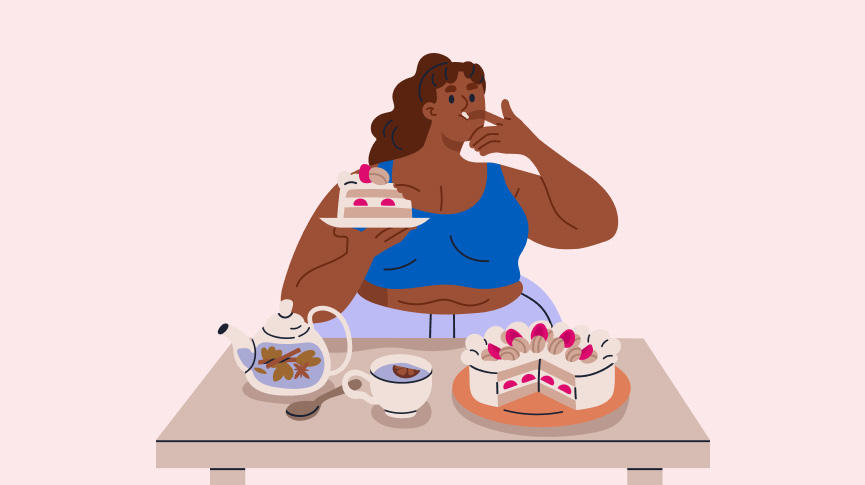What To Know About Binge Eating Disorder

When most people picture eating disorders, images of skeletal anorexics and purging bulimics come to mind. However, the most common eating disorder is one that may not manifest extreme outward symptoms.
Binge eating disorder is characterized by regularly eating large quantities of food within a short period of time, while feeling a loss of control over what you are eating. This goes beyond simple cravings or overeating occasionally.
Binge eaters often feel intense amounts of shame regarding their behavior and often cycle their binge eating with other types of disordered eating behaviors in a downward spiral that has a significant impact on their quality of life.
What Is Binge Eating Disorder?
In 2013, the fifth edition of the Diagnostic and Statistical Manual of Mental Disorders (DSM-V) created a new diagnostic category that they called Binge Eating Disorder (BED).
The DSM-V defines Binge Eating Disorder as “Eating, in a discrete period of time (e.g., within any 2-hour period), an amount of food that is definitely larger than most people would eat in a similar period of time under similar circumstances,” as well as “The sense of lack of control over eating during the episode (e.g., a feeling that one cannot stop eating or control what or how much one is eating).
During a binge-eating episode, the person experiences at least three of the following symptoms:
- Eating significantly faster than normal
- Eating until they feel uncomfortably full, and continuing to eat
- Eating large amounts of food without being driven by physical hunger
- Eating alone or in secret because of the embarrassment over how much they are eating
- Feeling depressed, disgusted or extremely guilty after overeating
BED is clinically diagnosed when such episodes occur, on average, at least once a week for three months.
BED is the most common specific eating disorder and the second most commonly diagnosed eating disorder, surpassed only by Other Specified Feeding or Eating Disordered (OSFED). BED affects around 2.7% of women, 1.7% of men, and 1.8% of adolescents in the U.S., and also has the highest lifetime prevalence among any eating disorder.
In a 2014 study published in Biological Psychiatry that used WHO data accumulated from 14 different countries that included lower-median development countries as well as high-earning ones, BED rates remained consistently higher than bulimia or anorexia nervosa.
Who Is At Risk For Developing Binge Eating Disorder?
Like many eating disorders, BED is more common in women than in men. It affects people across age ranges, cultures, and ethnicities, but often begins in the late teens or early 20s. Some factors associated with a higher risk of binge-eating disorder include:
- Other eating disorders – Many people who develop binge eating disorder have a history of other eating disorders, such as bulimia or anorexia, which may either turn into BED when the purging and starving behaviors stop, or blur into BED in a vicious yo-yo cycle
- Dieting – A history of restrictive eating often turns into binge-eating disorder. Severely limiting calories, or associating food with shame, can trigger an urge to binge eat. Our bodies are very good at fighting starvation, and prolonged restriction can cause your body to react with uncontrollable binging.
- Family history – If your parents or siblings have (or had) an eating disorder, you’re much more likely to develop one yourself. This may have both genetic components as well as environmental factors like disordered eating patterns being normalized within the home.
- Mental health conditions – Like any eating disorder, BED is often used as a coping mechanism for those with mental health issues such as anxiety or depression. Poor self-image and a stressful lifestyle may trigger binging. People with family histories of addiction, or who suffer from addiction themselves, are also more susceptible to Binge Eating Disorder.
BED May Be Underdiagnosed Due To Shame
Perhaps the most defining characteristic of Binge Eating Disorder is shame. This is because our society puts a premium on self-control, and being out of control around food – something we need to survive and are constantly surrounded by – feels like a basic human failing rather than the symptom of a larger mental health issue.
Anorexia and bulimia are unfortunately glamorized and normalized in certain ways. Many myths, legends, and classical stories portray women (and a few men) “wasting away” due to love or loss. St. Catherine of Siena was widely emulated for excessive fasting; the official patron saint of anorexia, her Anorexia mirabilis, or “holy anorexia,” was widely emulated as a sign of piety.
Bulimia is a more corporal cousin that is less glorified but in many ways normalized. Think about how often works of pop culture like Zoolander and Clueless have protagonists who carelessly reference “ralphing” after meals as an easy way to lose weight.
Binge Eating Disorder, on the other hand, though the most common eating disorder by a long shot with the highest rate of lifetime prevalence, is often overlooked because it implies a loss of control. Often, people who suffer from eating disorders are so ashamed by their binge that they engage in behaviors that are a sure path to further binging, such as self-castigation and calorie restriction.
Moreover, BED sufferers are more likely to be higher or normal weight, and it may feel embarrassing to share that you have an eating disorder when you don’t look the way you think people who have EDs should look. This all leads to an underdiagnosis and undertreatment of BED, a disease that left unchecked, comes with major complications like isolation, problems functioning in normal life, poor nutrition, and a host of medical conditions related to weight gain.
If you’re stuck in a cycle of binging and shame, know that there is help. Some ways to seek help include:
- Consulting with a mental health professional who specializes in eating disorders
- Strategizing with a nutritionist to find a plan you can stick to that regulates appetite and fulfills your nutritional requirements
- Seeking mental health help, such as therapy or a support group, to get to the root of the issues that trigger your binge eating

Clara Wang is a freelance writer based in Nashville, TN but often found abroad. She mostly muses about the three best things in life: Food, sex, and music. Her work has been featured in publications such as Eater Austin, Eater Nashville, Giddy, Buzzfeed, Refinery29, the Austin Chronicle, the Austin American Statesman, and the Daily Dot.


